Iran Acknowledges It Might Have Enriched Uranium To 84%
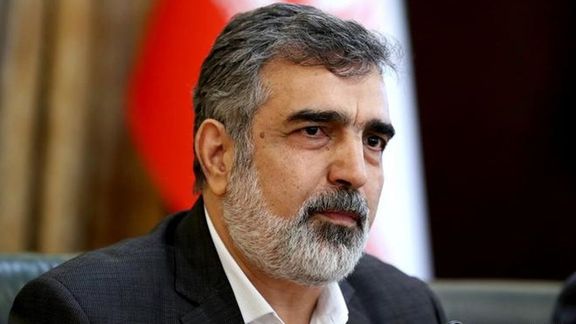
Iranian state television has offered a defense against an accusation attributed to International Atomic Agency Organization inspectors that it enriched uranium to 84% purity.

Iranian state television has offered a defense against an accusation attributed to International Atomic Agency Organization inspectors that it enriched uranium to 84% purity.
An Iranian official implicitly accepted the accusation, telling state television's English-language arm, Press TV that the allegation is a part of a “conspiracy” against Tehran amid tensions over its nuclear program.
Iran’s Nuclear Agency Spokesman Behrouz Kamalvandi said on Friday that finding highly-enriched uranium particles in the pipes connecting centrifuges was a “normal issue.”
“For example, we are producing 5 percent enriched [uranium], 11 percent particle is seen in it, or we are producing 20 percent [enriched uranium], 47 percent particle is seen in it. We had several correspondences about this in the past… it’s a natural thing in enrichment,” he noted.
“The machine is spinning fast. If the amount of the feed decreases for a moment, the enrichment will increase by a few percent; but it doesn’t matter because the end product is what matters.”
The allegation international inspectors found 84% enriched uranium threatens to further escalate tensions between Iran and the West. Should the claim be true, it would put the clerical regime closer than ever to weapons-grade material.
Iran now produces uranium enriched to 60% purity. Any accusation of enrichment higher than that further ratchets up tension over the program.
Israeli Prime Minister Benjamin Netanyahu has already threatened to take military action similar to when Israel previously bombed nuclear programs in Iraq and Syria.
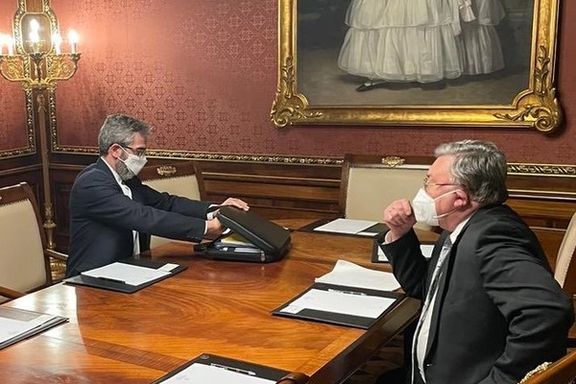
As February 24 marks one year of Russia's war in Ukraine, it also marks one year since Iran’s nuclear talks ended in Vienna, despite US reluctance to admit it.
In the days leading up to the invasion negotiators in the nuclear talks were scrambling to reach the finish line, promising to successfully conclude an arduous diplomatic process that had lasted eleven months. The United States, United Kingdom, France and Germany had been warning for weeks that Iran should make up its mind and the Vienna talks could not last indefinitely.
But in the second week of the Ukraine invasion, Russia’s foreign minister Sergei Lavrov dropped a bombshell, demanding an exemption from newly imposed Ukraine invasion sanctions for Moscow’s dealings with Iran.
Initially, it was said that Lavrov was demanding Western sanctions imposed on Russia not interfere with its nuclear dealings with Iran, but on March 6, a European diplomat in Vienna told Iran International that “Lavrov's demands were way above nuclear cooperation [allowed by the 2015 nuclear deal with Iran].”
The diplomat said that Russia's envoy in the Vienna talks, Mikhail Ulyanov, had first raised the issue of Ukraine sanctions only in relation to Moscow's role after a possible nuclear deal with Tehran, but Lavrov's remarks went much farther, demanding wider exemptions in dealings with Iran. That could open up a Russian sanctions-busting backdoor through Iran, an experienced operator in circumvention.
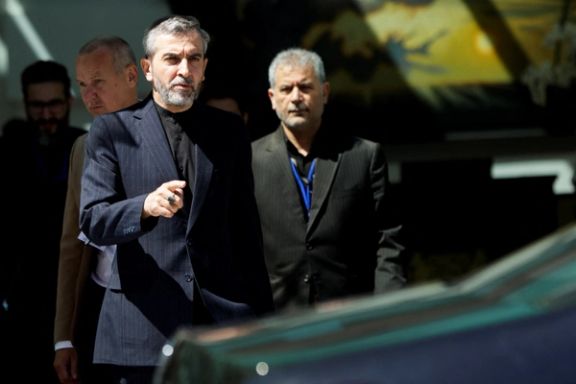
The following day, Iran’s chief negotiator, Ali Bagheri-Kani left from Vienna for Tehran, signaling the end to the talks.
It took another five months for the US National Security Advisor Jake Sullivan to warn that Iran was preparing to deliver military drones to Russia. Moscow began using the Kamikaze drones against Ukraine in early October, forcing Washington to finally say that the nuclear talks had reached an impasse.
However, the Biden administration seemed slow to realize the unwillingness of hardliners in Tehran to accept a deal, and Moscow’s ability to manipulate their intransigence.
"The new Russia-related sanctions are unrelated to the JCPOA and should not have any impact on its potential implementation," a State Department spokesperson said on March 5 adding that Washington continues to engage with Russia on a return to full implementation of the JCPOA. "Russia shares a common interest in ensuring Iran never acquires a nuclear weapon. "
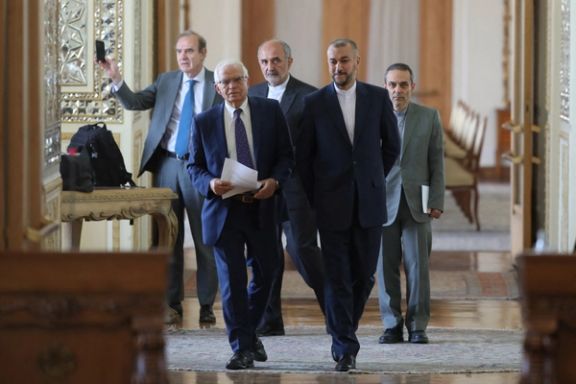
The writing was on the wall in early March that Moscow would hold an Iran nuclear agreement hostage and Tehran finding itself in more isolation would dance to Putin’s tune.
It seems the French knew it. "We are very close to an agreement − it is essential we conclude while we still can," foreign ministry spokeswoman Anne-Claire Legendre told reporters in a daily briefing March 8. "We are concerned by the risks that further delays could weigh on the possibility of concluding [a deal]."
However, the European Union, apparently with Washington’s blessing continued to push for an agreement, which increasing resembled chasing a bird which had flown away from the cage.
EU’s foreign policy chief Josep Borrell visited Tehran in June and began drafting a text that he hoped the US and the Islamic Republic would accept, based on the Vienna negotiations that Russia was insisting was 99 percent complete.
By early October, finally the United States realized that the effort was going nowhere. By that time, popular protests led by women had broken out in Iran, catching the imagination of global audiences. The kamikaze drones were flying in dozens over Ukraine, and finally the administration conceded that it was no longer “focused” on the JCPOA.
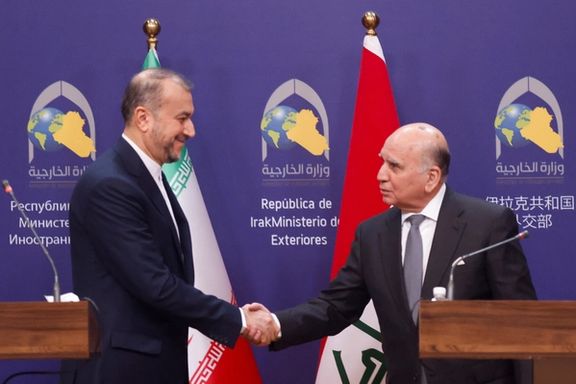
Iran will show a serious response if the West activates the UN’s “trigger mechanism” to bring back international sanctions, a top member of parliament said Thursday.
Hossein-Ali Haji Dalegani, a hardliner a member of parliament’s presidium told Fars news agency in Tehran that as part of the Islamic Republic’s serious reaction, access for UN nuclear inspectors to Iran’s nuclear facilities will be blocked.
Iranian officials and media have somewhat focused on the issue of a provision in the 2015 nuclear accord (JCPOA) that allows signatories to trigger the return of international sanctions if Iran is found violating the cap on its nuclear activities. The term ‘snapback’ is also used for bringing back the international sanctions that were suspended after the JCPOA was signed in 2015.
So far, after four years of Iran’s violations by higher-level uranium enrichment, the Western powers have not taken that step, but recent developments have increased the likelihood.
A report by Bloomberg News last week said that inspectors from the International Atomic Energy Agency (IAEA) have found uranium particles in Iran’s nuclear installations that were enriched to 84-percent purity. The IAEA has not denied the report. Such a level of purified uranium is the closes Iran ha come to weapons-grade fissile material.
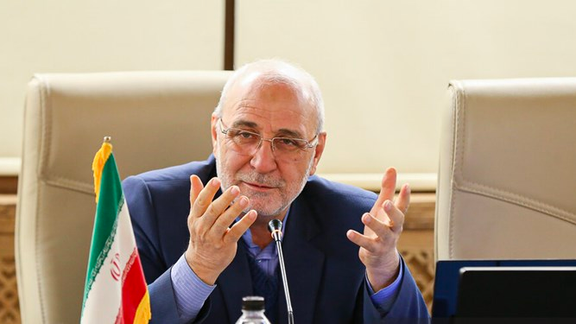
This can be sufficient reason for the three European signatories of the JCPOA – the United Kingdom, France and Germany – to use the trigger mechanism at the UN Security Council to bring back international sanctions.
Russia and China, according to the provisions of the mechanism, cannot veto the move, although they can ignore the sanctions and continue trading with Iran. In the current global circumstances, Russia will certainly not abide by any sanction’s regime.
Nevertheless, Iranian are nervous and government-controlled media in Tehran reflects that mood. What specially rattled nerves was a statement by Israel’s foreign minister Eli Cohen on Tuesday, who said that the West would impose “snapback” sanctions on Iran before the 78th UN General Assembly in September of this year.
Foreign Minister Hossein Amir-Abdollahian, who was visiting Iraq on Wednesday, threatened that “If America chooses a different path, we are also ready to resort to our Plan B and a different path and all option will be on the table.”
So far however, all the Biden administration has been saying is that they are not pursuing the path to revive the JCPOA, as they had been doing from April 2021 to September 2022.
State Department spokesperson Ned Price on Wednesday reiterated that the JCPOA “has not been on the agenda for some time,” when asked to comment about Iranian claims that the Sultan of Oman will soon visit Tehran to pursue the resumption of nuclear talks after they reached an impasse last September.
While insisting that the administration views diplomacy as the best way to deal with Iran’s nuclear program, Price stressed on three conditions.
“Our focus has been on Iran’s brutality, its repression against its own people; it has been on Iran’s provision of UAV technology to Russia; it’s been on our ceaseless efforts to see our wrongful detainees freed,” Price said, leaving out the issue of Iran’s malign behavior in the region from any potential new talks.
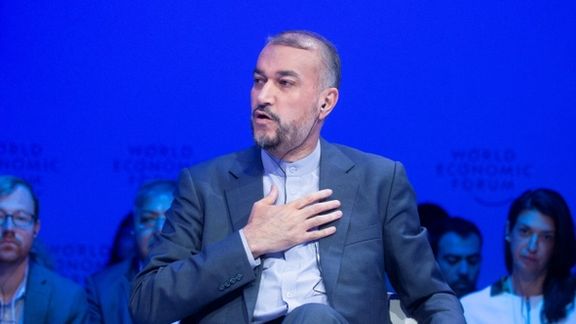
International Atomic Energy Agency (IAEA) officials will visit Tehran in the coming days, Iran's Foreign Minister Hossein Amir-Abdollahian said on Wednesday.
"In the framework of concluding negotiations, IAEA officials will travel to Tehran in the coming days," the minister said during a press briefing with his Iraqi counterpart in Baghdad.
"We hope that IAEA Director Grossi will reach an agreement with Iran's Atomic Energy Organization from a non-political and technical standpoint," Amir-Abdollahian added.
Iran's semi-official Tasnim news agency had earlier reported the head of Iran's Atomic Energy Organization Mohammad Eslami as saying that IAEA inspectors had been in Tehran since Tuesday and had started negotiations, visits and checks to resolve "ambiguities created by an inspector".
Last week, the UN nuclear watchdog said it was discussing the results of recent verification activities with Iran after Bloomberg News reported that the agency had detected uranium enriched to 84% purity, which is close to weapons grade.
A spokesperson for Iran's Atomic Energy Organization denied the report on Monday and said Tehran's uranium enrichment did not exceed 60% purity.
"Through interactions and coordination, we are preventing the rise of new ambiguities and disruptions to our cooperation with the agency," Eslami was quoted as saying on Wednesday.
Since the US withdrawal from a 2015 nuclear deal in 2018, Iran has gradually started going beyond the pact's nuclear curbs and enriching uranium to up to 60% purity in April 2021.
"The Islamic Republic of Iran has never sought to acquire an atomic bomb," Amir-Abdollahian added.
Report by Reuters
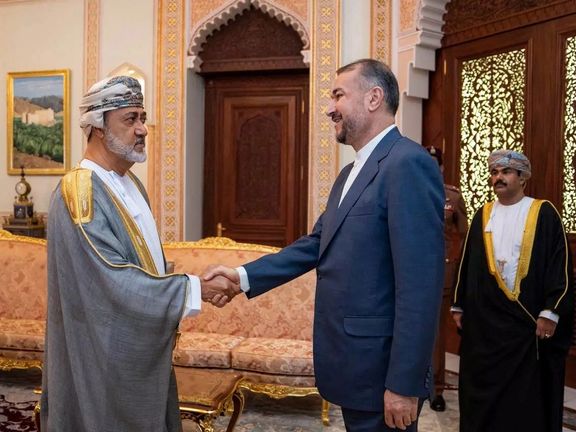
The Sultan of Oman, Haitham bin Tariq, will visit Tehran in the coming days to hold talks regarding the stalled nuclear negotiation between Iran and the West.
The Sultan of Oman, Haitham bin Tariq, will visit Tehran to hold talks regarding the stalled nuclear negotiation between Iran and the West.
MP Ali Alizadeh told Tasnim News Agency on Tuesday that "Omani authorities have recently expressed willingness to play the role of mediator between Iran and the United States in order to bring the nuclear negotiations to a conclusion”.
He made the comments after the National Security and Foreign Policy Committee of the Parliament held a meeting on Tuesday with Foreign Minister Hossein Amir-Abdollahian.
In the last two decades, Oman has acted as an intermediary between Tehran and Washington and has been successful in matters such as exchange of prisoners and the resolution of some disputes in nuclear negotiations.
Iran’s Foreign Ministry has recently claimed again that the US has tied the exchange of prisoners between the two countries to the nuclear negotiations.
Iran's negotiations with world powers to revive the 2015 nuclear deal have stalled since September.
Due to the suppression of nationwide protests in Iran and providing Russia with Iranian weapons in the war on Ukraine, the White House National Security Advisor, Jake Sullivan, said in January the US “priority right now is not the JCPOA". “This is not the moment or the context to place priority on that," Sullivan said.
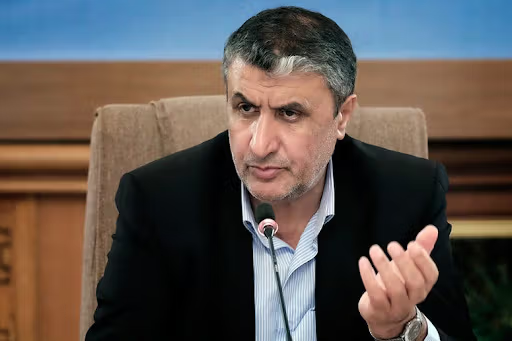
Inspectors from the UN nuclear watchdog are in Tehran to resolve "ambiguities", Iranian media quoted the country's nuclear chief as saying on Wednesday.
"Officials of the International Atomic Energy Agency are in Tehran and have been starting negotiations, visits and checks ... Ambiguities created by an inspector are being resolved," the head of Iran's Atomic Energy Organization Mohammad Eslami was quoted by Tasnim news website affiliated with the Revolutionary Guard.
Last week, the UN nuclear watchdog said it was discussing the results of recent verification activities with Iran after Bloomberg News reported that the agency had detected uranium enriched to 84% purity, which is close to weapons grade.
So far, the IAEA has not reported if it has dispatched any officials to Tehran to resolve the issue with enrichment.
A spokesperson for Iran's Atomic Energy Organization denied the report on Monday and said Tehran's uranium enrichment did not exceed 60% purity.
"Through interactions and coordination, we are preventing the rise of new ambiguities and disruptions to our cooperation with the agency," Eslami was quoted as saying on Wednesday.
If the UN watchdog officially confirms the existence of 84-percent enriched uranium in Iran, the European signatories of the 2015 nuclear deal, the JCPOA, the United Kingdom, France and Germany can initiate the agreement’s ‘trigger mechanism’ at the UN Security Council to reinstate international sanctions suspended in 2015.
Since the US withdrawal from a 2015 nuclear deal in 2018, Iran has gradually started going beyond the pact's nuclear curbs and enriching uranium to up to 60% purity in April 2021.